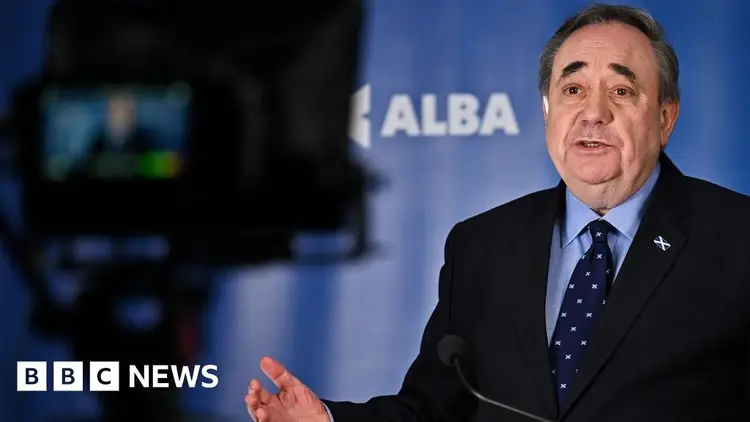Alex Salmond: A politician who loved creating headlines

Alex Salmond thrived on being the center of attention. He would feel let down if an interview he conducted didn’t generate enough excitement to make the headlines.
When I was starting out as a radio journalist, I was tasked with attending a business breakfast event to meet him. At that time, he was advocating for the UK to adopt the single European currency.
When I pointed out that this wasn't a fresh idea and that he had mentioned it numerous times in the past, he replied, "True, but I'm emphasizing it more strongly now because the situation has become more critical."
Anything to ensure his input is valued.
Being around him could easily cause you to lose track of time. He usually didn’t set a time limit for interviews and liked to engage in more discussion, exchange ideas, and even showcase his knowledge once the microphones were off.
I recall conducting an interview with him when he was newly appointed as first minister at his official residence, Bute House in Edinburgh.
The interview had wrapped up, and I was ready to leave, but he insisted on showing me a set of silverware he had discovered in a cupboard, eager to share its background with me.
Though he had a way of being engaging and amusing and consistently provided insightful commentary on current political affairs, there was also a more unappealing aspect to his personality.
I often felt a twinge of discomfort when he occasionally displayed impatience and annoyance with his team. He had high expectations and could be quite tough on them.
I recall taking a senior editor from the BBC newsroom in London to meet him, and I was taken aback when he asked my colleague if they were visiting from a colonial standpoint.
Alex Salmond and Alistair Darling engaged in a discussion moderated by Glenn Campbell prior to the 2014 Scottish independence vote.
He had a complex relationship with the BBC. He appreciated being invited to appear on notable programs like Question Time, particularly during the downturn of his political career.
At other moments, he would express his frustration over the results he found unsatisfactory.
He was displeased that I conducted an anonymous interview with one of the women who had accused him of sexual offenses in court, even though he had been cleared of all charges.
It wasn't an effort to revisit the case; rather, it was a reply to his allegations of a political plot. I can't say for certain if he ever forgave me for it.
I journeyed with him to Europe, the U.S., and China. I recall a time when he showed up unusually early at the Forbidden City in Beijing to meet with China's vice-premier, only to discover that he was locked out.
It could have created some amazing footage for TV, but I'm pretty sure we didn't record it. He believed we had caught this awkward moment on tape and then offered me a private briefing along with some exclusive information, hoping I wouldn't share it.
Alex Salmond was deeply immersed in the world of politics, and his sense of purpose appeared to vanish when he was removed from parliament in 2017.
I ran into him in Edinburgh not long after and we hopped into a taxi to Waverley station together. As expected, we chatted about politics, and even when it was time to say goodbye, he continued the discussion.
In the past few years, our conversations have dwindled. He declined to join a podcast series I created focusing on Nicola Sturgeon’s tenure, which would have naturally covered their dramatic fallout.
That wasn't his usual behavior. From what I've seen in the past, he hardly ever passed up a chance to engage with the media.
He believed it was more advantageous to take a proactive approach and present his arguments instead of retreating and allowing others to define the story.

















































